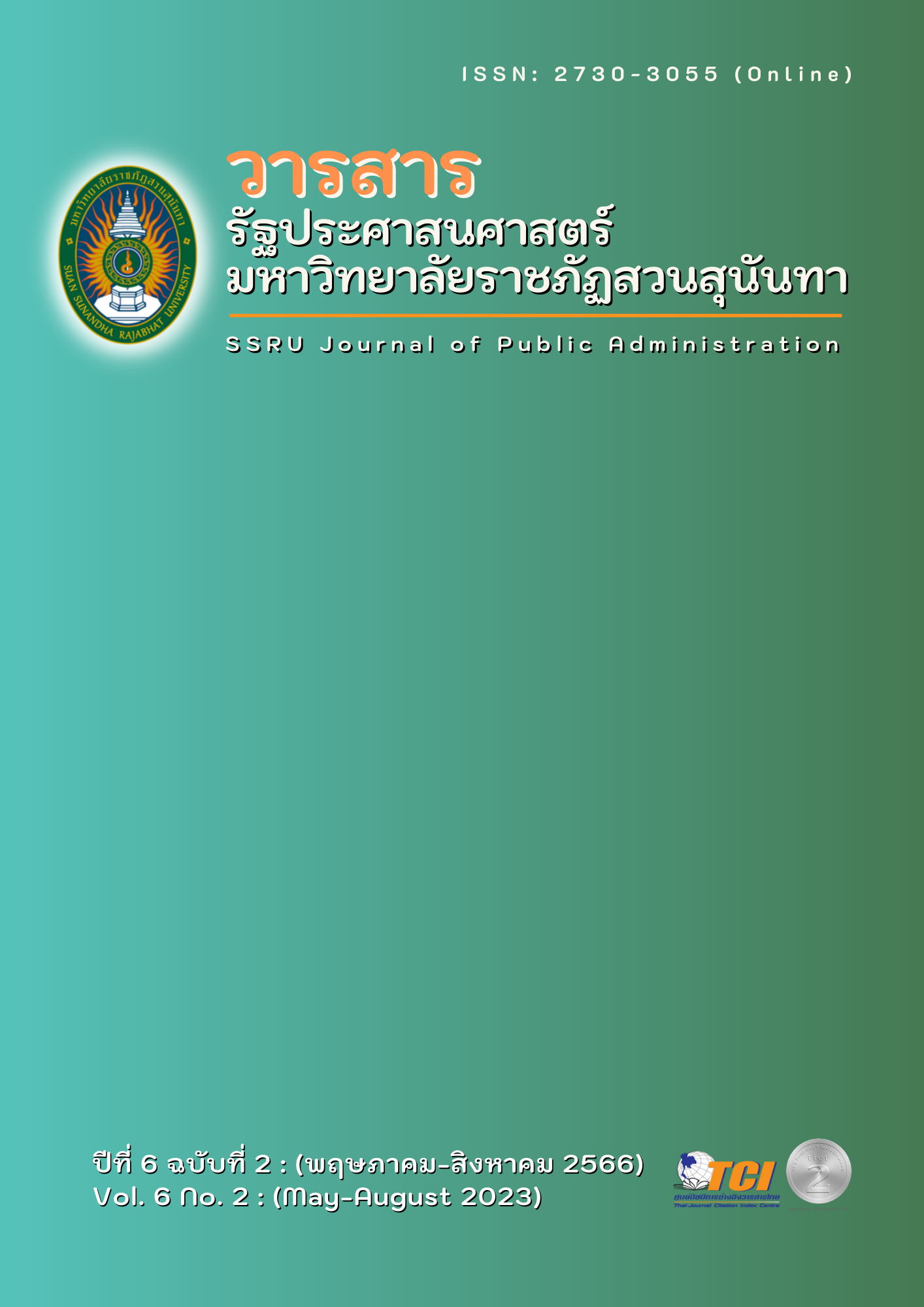ความสัมพันธ์ระหว่างแนวคิดการแบ่งปันความรู้และพฤติกรรมการทำงานเชิงนวัตกรรมของโรงเรียนในสังกัดกรุงเทพมหานคร
Main Article Content
บทคัดย่อ
จุดมุ่งหมายหลักในการศึกษาครั้งนี้ คือ เพื่อศึกษาอิทธิพลในระดับองค์ประกอบของการแบ่งปันความรู้ที่ส่งผลต่อองค์ประกอบของพฤติกรรมการทำงานเชิงนวัตกรรมของโรงเรียนในสังกัดกรุงเทพมหานคร หน่วยในการวิเคราะห์ คือโรงเรียนในสังกัดกรุงเทพมหานคร จำนวนโรงเรียนทั้งหมด 437 โรงเรียน กลุ่มตัวอย่างประกอบไปด้วยจำนวนผู้ตอบแบบสอบถามจำนวน 1,002 คน จากจำนวนโรงเรียน 202 โรงเรียน และภายหลังที่ได้นำข้อมูลที่มีค่าผิดปกติไปจากกลุ่มออกจากการวิเคราะห์ เหลือจำนวนโรงเรียน 195 โรงเรียน โดยออกแบบการวิจัยเป็นแบบเชิงความสัมพันธ์และแบบภาคตัดขวาง แนวทางการวิเคราะห์ใช้เทคนิคการวิเคราะห์เส้นทาง
ผลการศึกษาพบว่าทุกองค์ประกอบของการแบ่งปันความรู้มีค่าสหสัมพันธ์เชิงบวกกับทุกองค์ประกอบของพฤติกรรมการทำงานเชิงนวัตกรรม นอกจากนั้น พบว่า เมื่อพิจารณาในภาพรวม องค์ประกอบด้านปฏิสัมพันธ์ส่วนบุคคลมีอิทธิพลเชิงบวกที่สำคัญที่สุดต่อพฤติกรรมการทำงานเชิงนวัตกรรม ในขณะที่องค์ประกอบด้านการสื่อสารองค์การมีอิทธิพลเชิงบวกที่สำคัญเป็นลำดับสองต่อพฤติกรรมการทำงานเชิงนวัตกรรม และจากข้อค้นพบ นโยบายที่ส่งเสริมพฤติกรรมการแบ่งปันความรู้ โดยเฉพาะอย่างยิ่ง การแบ่งปันความรู้ด้วยวิธีการปฏิสัมพันธ์ส่วนบุคคลและการสื่อสารองค์การ ควรได้รับการพัฒนาและปรับปรุงเพื่อที่จะส่งเสริมสนับสนุนให้เกิดพฤติกรรมการทำงานเชิงนวัตกรรมภายในองค์การ
Article Details

อนุญาตภายใต้เงื่อนไข Creative Commons Attribution-NonCommercial 4.0 International License.
เอกสารอ้างอิง
สำนักการศึกษากรุงเทพมหานคร. (2562). รายงานประจำปี 2561. กรุงเทพฯ: สำนักการศึกษากรุงเทพมหานคร.
Ahmad, F., & Karim, M. (2019). Impacts of knowledge sharing: A review and directions for future research. Journal of Workplace Learning, 31(3), 207-230.
Anser, M.K., Yousaf, Z., Khan, A., & Usman, M. (2020). Towards innovative work behavior through knowledge management infrastructure capabilities: Mediating role of functional flexibility and knowledge sharing. European Journal of Innovation Management, 24(2), 461-480.
AlMulhim, A. F. (2020). Linking knowledge sharing to innovative work behaviour: The role of psychological empowerment. Journal of Asian Finance, Economics and Business, 7(9), 549–560.
Baer, M. (2012). Putting creativity to work: The implementation of creative ideas in organisations. Academy of Management Journal, 55(5), 1102-1119.
Chen, C.-J., Huang, J.-W., & Hsiao, Y.-C. (2010). Knowledge management and innovativeness: The role of organizational climate and structure. International Journal of Manpower, 31(8), 848-870.
De Jong, J., & Den Hartog, D. (2010). Measuring innovative work behaviour. Creativity and Innovation Management, 19(1), 23-36.
Gomes, G., & Wojahn, R. M. (2017). Organizational learning capability, innovation and performance: Study in small and medium-sized enterprises (SMES). Revista de Administração (São Paulo), 52(2), 163-175.
Janssen, O. (2000). Job demands, perceptions of effort-reward fairness, and innovative work behavior. Journal of Occupational and Organizational Psychology, 73(3), 287-302.
King, N., & Anderson, N. (2002). Managing innovation and change: A critical guide for organizations (2nd ed.). London: Thomson Learning.
Kmieciak, R. (2021). Trust, knowledge sharing, and innovative work behavior: Empirical evidence from Poland. European Journal of Innovation Management, 24(5), 1832-1859.
Kock, N. (2015). Common method bias in PLS-SEM: A full collinearity assessment approach. International Journal of e-Collaboration, 11(4), 1-10.
Kock, N., & Lynn, G.S. (2012). Lateral collinearity and misleading results in variance-based SEM: An illustration and recommendations. Journal of the Association for Information Systems, 13(7), 546-580.
Kremer, H., Villamor, I., & Aguinis, H. (2019). Innovation leadership: Best practice recommendations for promoting employee creativity, voice and knowledge sharing. Business Horizons, 62(1), 65–74.
Lee, J-N. (2001). The impact of knowledge sharing, organizational capability and partnership quality on IS outsourcing success. Information and Management, 38(5), 323-335.
Lin, H.-F. (2007). Knowledge sharing and firm innovation capability: An empirical study. International Journal of Manpower, 28(3/4), 315-332.
Liua, Y., & Phillips, J. S. (2011). Examining the antecedents of knowledge sharing in facilitating team innovativeness from a multilevel perspective. International Journal of Information Management, 31(1), 44-52.
Nonaka, I. (1991). The knowledge creating company. Harvard Business Review, 69(6), 96-104.
Nonaka, I. (1994). A dynamic theory of organizational knowledge creation. Organization Science, 5(1), 14-37.
Nonaka, I., Krogh, G. V., & Voelpel, S. (2006). Organizational knowledge creation theory: Evolutionary paths and future advances. Organization Studies, 27(8), 1179-1208.
Nonaka, I., & Takeuchi, H. (1995). The knowledge-creating company: How Japanese companies create the dynamics of innovation: Oxford University Press.
Phong, L. B., Hui, L., & Son, T. T. (2018). How leadership and trust in leaders foster employees’ behavior toward knowledge sharing. Social Behavior and Personality: An International Journal, 46(5), 705-720.
Scott, S. G., & Bruce, R. A. (1994). Determinants of innovative behavior: A path model of individual innovation in the workplace. The Academy of Management Journal, 37(3), 580-607.
Steyn, R., & De Bruin, G. (2019). The structural validity of the innovative work behaviour questionnaire: Comparing competing factorial models. Southern African Journal of Entrepreneurship and Small Business Management, 11(1), a291. Retrieved from https://doi.org/10.4102/sajesbm.v11i1.291
Van Den Hooff, B., & De Ridder, J. A. (2004). Knowledge sharing in context: The influence of organizational commitment, communication climate and CMC use on knowledge sharing. Journal of Knowledge Management, 8(6), 117-130.
Yi, J. (2009). A measure of knowledge sharing behavior: Scale development and validation. Knowledge Management Research & Practice, 7(1), 65-81.


